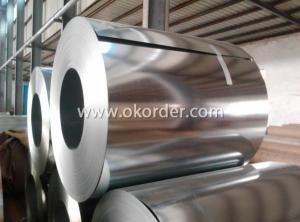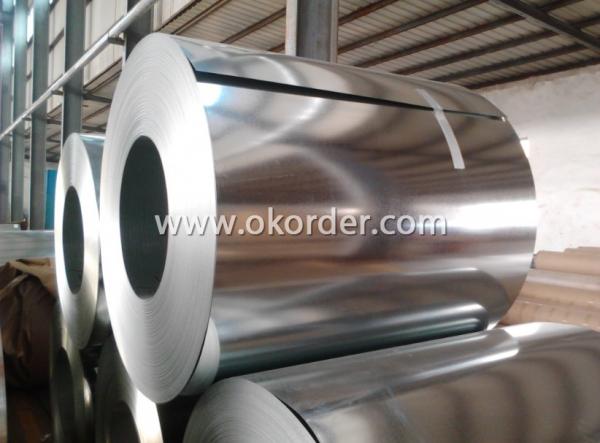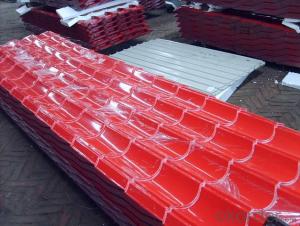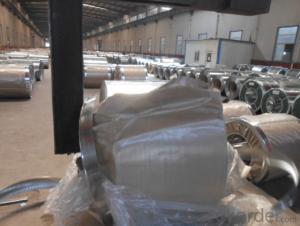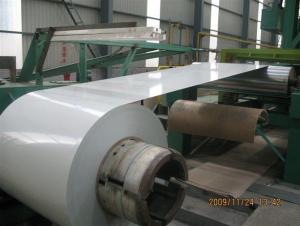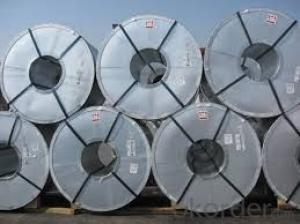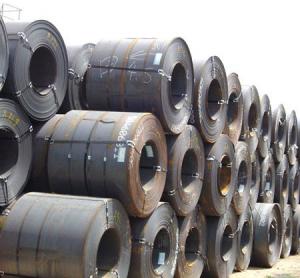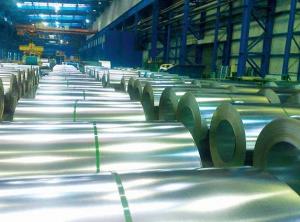Hot dipped Galvanized Steel Coil Z180
- Loading Port:
- China Main Port
- Payment Terms:
- TT or LC
- Min Order Qty:
- -
- Supply Capability:
- -
OKorder Service Pledge
Quality Product, Order Online Tracking, Timely Delivery
OKorder Financial Service
Credit Rating, Credit Services, Credit Purchasing
You Might Also Like
HOT DIP GALVANIZED STEEL COIL
Specification:0.6mm*1000mm*c
Steel Grade & Standard: ASTM A653
Zinc Coating Mass:Z180 Spangle:Zero Spangle
Surface Treatment: non-chromate, oiled
Coil ID:508mm Coil Weight:6-10MT
Package Type:EYE TO SIDE
Thickness Tolerance:+/-0.02mm Width Tolerance:+/-5mm
Zinc Coating Tolerance:-/+10g/m2
- Q: How do steel coils contribute to sustainable construction?
- Steel coils contribute to sustainable construction in several ways. Firstly, steel is a highly durable and long-lasting material, which means that structures built using steel coils have a longer lifespan and require fewer repairs and replacements. This reduces the overall environmental impact of construction by minimizing waste and resource consumption. Additionally, steel is a highly recyclable material, and steel coils can be easily recycled at the end of their life cycle, reducing the need for new steel production and conserving natural resources. Furthermore, steel is a fire-resistant material, providing enhanced safety and reducing the risk of structural damage during fire incidents. Overall, the use of steel coils in construction promotes sustainability by minimizing environmental impact, conserving resources, and ensuring the longevity and safety of structures.
- Q: What are the different types of steel coil edge finishes?
- There are several types of steel coil edge finishes, including mill edge, slit edge, and sheared edge. Mill edge refers to the natural, untreated edge of the steel coil as it comes from the mill. Slit edge is created when the coil is slit into narrower widths, resulting in a smooth, burr-free edge. Sheared edge is produced when the coil is cut using mechanical shearing, resulting in a slightly rougher edge compared to slit edge.
- Q: How are steel coils used in the manufacturing of transmission systems?
- Steel coils are used in the manufacturing of transmission systems to create various components such as gears, shafts, and bearings. These coils are often transformed into flat sheets or strips, which are then shaped and processed to form the required parts. The strength and durability of steel make it an ideal material for transmission systems as it can withstand the high stress and torque associated with transmitting power from the engine to the wheels efficiently and reliably.
- Q: What are the different methods of laminating steel coils?
- There are several different methods of laminating steel coils, each with its own advantages and applications. The most common methods include hot rolling, cold rolling, and continuous annealing. Hot rolling is a process in which steel is heated above its recrystallization temperature and then passed through a series of rollers to produce thin sheets or coils. This method is commonly used for producing large quantities of steel with a consistent thickness and surface finish. Hot rolled steel coils are often used in structural applications, such as construction and automotive manufacturing. Cold rolling, on the other hand, involves passing the steel coil through a series of rollers at room temperature. This process not only reduces the thickness of the steel but also improves its surface finish and mechanical properties. Cold rolled steel coils are typically used in industries that require high precision and quality, such as appliance manufacturing, electrical equipment, and automotive components. Continuous annealing is another method of laminating steel coils. It involves heating the steel coil to a specific temperature and then slowly cooling it in a controlled environment. This process helps to relieve internal stresses and improve the steel's mechanical properties, such as strength and ductility. Continuous annealing is often used for producing high-quality steel coils for applications that require superior surface finish and formability, such as automotive body panels and household appliances. Other less common methods of laminating steel coils include electro-galvanizing, which involves coating the steel with a layer of zinc through an electroplating process, and hot-dip galvanizing, where the steel coil is dipped into a bath of molten zinc. These methods are primarily used for corrosion protection and are commonly seen in the construction industry, particularly for outdoor structures and infrastructure. In summary, the different methods of laminating steel coils include hot rolling, cold rolling, continuous annealing, electro-galvanizing, and hot-dip galvanizing. Each method offers distinct benefits and is chosen based on the specific requirements of the application.
- Q: Can steel coils be coated with vibration-damping materials?
- Yes, steel coils can be coated with vibration-damping materials. These materials, such as rubber-based compounds or specialty coatings, can help reduce vibrations and dampen the noise generated by the steel coils during operation.
- Q: What are the common coil lengths available for steel coils?
- The steel coil lengths offered in the industry and specific requirements are subject to variation. Nonetheless, several standard coil lengths are extensively employed in different applications. These encompass coil lengths of 100 feet (30.48 meters), 200 feet (60.96 meters), 300 feet (91.44 meters), and 500 feet (152.4 meters). These lengths find extensive use in construction, manufacturing, and automotive sectors, where steel coils serve diverse purposes. It is worth mentioning that coil lengths can also be tailored to meet specific project requirements or customer preferences.
- Q: How are steel coils used in the production of medical equipment?
- Steel coils have various applications in the manufacturing of medical equipment. One way they are commonly used is in the production of surgical instruments. Scalpels, forceps, and clamps, for example, require a cutting edge that is both sharp and long-lasting. Steel coils are ideal for creating these edges as they can be easily shaped, hardened, and sharpened, ensuring precision and durability. Furthermore, medical devices like braces, orthopedic implants, and prosthetics often incorporate steel coils. These devices necessitate materials with exceptional strength and durability to provide support and stability to the body. Steel coils can be molded into different forms and sizes to meet the specific needs of patients, delivering the required support and functionality. Moreover, steel coils find application in the manufacturing of medical equipment such as MRI machines and X-ray systems. These machines rely on robust and dependable components to guarantee accurate imaging and diagnostics. Steel coils are integral to the construction of these machines as they provide stability and structural support, enabling precise and high-quality imaging. To summarize, steel coils are of utmost importance in the production of medical equipment as they offer strength, durability, and versatility. Whether it's surgical instruments, orthopedic devices, or diagnostic machines, steel coils are utilized to create dependable and high-performing medical equipment that ultimately enhances patient care and outcomes.
- Q: What are the different methods of edge trimming steel coils?
- Manufacturers have various methods at their disposal for edge trimming steel coils, which are chosen based on their specific preferences and requirements. Some commonly used methods include: 1. Slitting: This method involves passing the coil through rotating circular blades to precisely cut the edges. It is suitable for different thicknesses of steel coils. 2. Milling: By using milling cutters, excess material is removed to achieve the desired edge finish. Milling is often employed for thicker steel coils or when a specific edge profile is needed. 3. Shearing: A sharp blade is used to cut the steel coil along a straight line, providing a clean and straight edge. This method is commonly used for thinner steel coils. 4. Laser cutting: Edge trimming is achieved by utilizing a focused laser beam to melt or vaporize the excess material, resulting in a precise and smooth edge. Laser cutting is often preferred for thinner gauges or when intricate shapes or patterns are necessary. 5. Water jet cutting: This method involves a high-pressure stream of water mixed with abrasive particles to trim the edges of the steel coil. Water jet cutting offers a versatile and precise cutting solution, particularly for thicker steel coils and complex shapes. Manufacturers should carefully assess their specific requirements, including coil thickness, desired edge finish, speed, and cost, to choose the most suitable edge trimming method for their steel coils.
- Q: How are defects in steel coils detected and resolved?
- Defects in steel coils are typically detected through various non-destructive testing methods such as visual inspection, ultrasonic testing, magnetic particle testing, and eddy current testing. Once a defect is identified, it is resolved through processes like grinding, polishing, welding, or cutting out and replacing the affected area. The specific resolution method depends on the type and severity of the defect, ensuring that the steel coils meet the required quality standards before further processing or usage.
- Q: What is steel made of and what is its molecular weight? It's for a project in chemistry class so if you have a website link as well, that would be great!
- Steel is an alloy consisting mostly of iron with a little Carbon thrown in. Steel is not a molecule, therefore, it does not have a molecular weight. Steel contains atoms of iron and carbon in a crystal lattice, along with various other alloying elements such as manganese, chromium, vanadium, and tungsten.
Send your message to us
Hot dipped Galvanized Steel Coil Z180
- Loading Port:
- China Main Port
- Payment Terms:
- TT or LC
- Min Order Qty:
- -
- Supply Capability:
- -
OKorder Service Pledge
Quality Product, Order Online Tracking, Timely Delivery
OKorder Financial Service
Credit Rating, Credit Services, Credit Purchasing
Similar products
Hot products
Hot Searches
Related keywords
